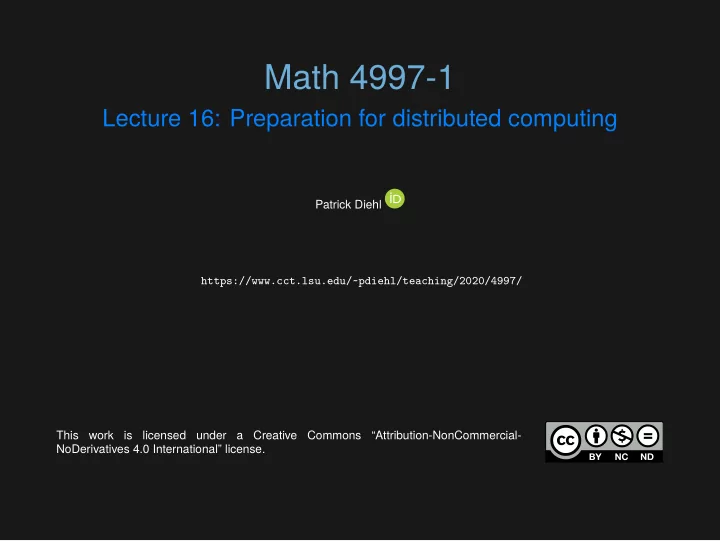

Math 4997-1 Lecture 16: Preparation for distributed computing Patrick Diehl https://www.cct.lsu.edu/~pdiehl/teaching/2020/4997/ This work is licensed under a Creative Commons “Attribution-NonCommercial- NoDerivatives 4.0 International” license.
Reminder Serialization Components Summary References
Reminder
Lecture 15 What you should know from last lecture delete expression ◮ Parallel partition-based implementation ◮ Allocating and deallocating memory with the new and
Serialization
What is this serialization thingy If we want to send ab object or a bunch of objects over the network to another node of the cluster: one-dimensional stream of bits. stream of bits and convert it back to the objects(s) You have to decide whether to serialize ◮ The sender needs to fmatten the object(s) to a ◮ The receiver needs to unfmatten the one-dimensional ◮ human-readable (text) ◮ non-human-readable (binary)
Serialization in HPX [1] Initialize data size_t size = 5; double* data = new double[size]; Serialization using hpx::serialization::serialize_buffer; serialize_buffer <double > serializable_data( data, size, serialize_buffer <double >::init_mode::reference); Deserialization double* copied_data = serializable_data.data();
Sending data over the network Allocate data Serialize data Send parcel Locality 1 Deserialize data Allocate data Receive parcel Locality 2 The communication between the localities (nodes) is handled by the so-called parcel port [2]. HPX uses MPI or libfrabric for communication between nodes.
Components
Components and Actions For distributed computations within HPX, we need to look into following 1. Server (Component) The server represents the global data and is a so-called HPX component which allows to create and access the data remotely through a global address space (AGAS [3]) using hpx::id_type . 2. Component action Each function of the component needs to be wrapped into a component action to be remotely available. 3. Plain actions Allows to wrap global ( static ) functions in an action. So this function can be called remotely on a given locality.
Server (Component) struct data_server : hpx::components::component_base <data_server >{ data_server(size_t size) { data = std::shared_ptr <double[]>(new double[size]); } private: // This data will be in the global address space std::shared_ptr <double[]> data; }; Note that we need component actions to call the public functions of the server.
Component actions struct data_server : hpx::components::component_base <data_server >{ // This function needs to be wrapped in an action hpx::serialization::serialize_buffer <double > getData() { typedef hpx::serialization::serialize_buffer <double > buffer; return buffer(data.get(), size, buffer::init_mode::reference); } // Define the action for remote access HPX_DEFINE_COMPONENT_DIRECT_ACTION(data_server , getData , getData_action); };
Component actions // Define the action for remote access HPX_DEFINE_COMPONENT_DIRECT_ACTION( data_server , getData , getData_action); where ◮ The fjrst argument is the name of the component ◮ The second argument is the name of the function ◮ The third argument is the name of the action
Registering components and actions // Generation of the code, which is needed to call // the component action remotely // Registering the component typedef hpx::components::component <data_server > data_server_type; HPX_REGISTER_COMPONENT(data_server_type , data_server); // Registering the component actions typedef data_server::getData_action getData_action; HPX_REGISTER_ACTION(getData_action);
The data client I struct data : hpx::components::client_base <data,data_server > { // Define client base typedef hpx::components::client_base <data, data_server > base_type; // Constructor to generate the data_server object // The where argument specifies where the object is // allocated data(hpx::naming::id_type where,std::size_t size) : base_type(hpx::new_<data_server >(where,size)){} );
The data client II struct data : hpx::components::client_base <data,data_server > { // Wrap the actions into futures hpx::future<size_t> getSize(){ return hpx::async(getSize_action(),get_id()); } typedef hpx::serialization::serialize_buffer <double > buffer; hpx::future<buffer>getData(){ return hpx::async(getData_action(),get_id()); } );
Global functions Function defjnition static void square(double a ){ std::cout << a * a << std::endl; } Defjne the action HPX_PLAIN_ACTION(square, square_action); where ◮ The fjrst argument is the name of the function ◮ The second argument is the name of the action
Knowing where you are Getting the ID of your locality hpx::find_here(); Getting the ID of the component’s locality hpx::get_colocation_id(hpx::launch::sync, get_id(); Getting the ID of the component’s locality bool is_local = (hpx::get_colocation_id(hpx::launch::sync, get_id()) == hpx::find_here());
Summary
Summary After this lecture, you should know – Plain actions – Components – Components actions ◮ Serialization ◮ Distributed computing
References
References I [1] John Biddiscombe, Thomas Heller, Anton Bikineev, and Hartmut Kaiser. Zero Copy Serialization using RMA in the Distributed Task-Based HPX runtime. In 14th International Conference on Applied Computing . IADIS, International Association for Development of the Information Society, 2017. [2] Hartmut Kaiser, Maciek Brodowicz, and Thomas Sterling. Parallex an advanced parallel execution model for scaling-impaired applications. In 2009 International Conference on Parallel Processing Workshops , pages 394–401. IEEE, 2009.
References II [3] Hartmut Kaiser, Thomas Heller, Bryce Adelstein-Lelbach, Adrian Serio, and Dietmar Fey. Hpx: A task based programming model in a global address space. In Proceedings of the 8th International Conference on Partitioned Global Address Space Programming Models , page 6. ACM, 2014.
Recommend
More recommend